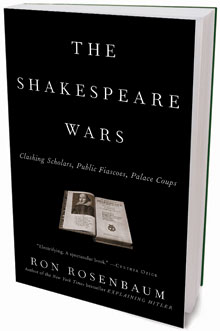
ALARUMS AND EXCURSIONS: Hurly-burly from Rosenbaum, but also real discussion of revision in Hamlet and Lear.
|
The rub is that Rosenbaum wants to be a player as well as a war correspondent: he keeps plumping for compliments when he should be plumbing the Bardic bottom. It all started, we learn, when he was a Yale graduate student. “The faculty sherry parties had a lot to do with it: watching my fellow graduate students assiduously sucking up to Harold Bloom and other stars of the department, their sherry-flushed faces perspiring from the damp mothball-mildew warmth of their tweeds. While the world outside — it was 1968! — was exploding with fearful, thrilling events.” Rosenbaum commits “a faux pas of Richter-scale proportions” by asking some question about the importance of love in Chaucer’s love-vision poems, whereupon “a shocked silence ensued among the other grad students and faculty.” His heart broken, he slinks out of grad school, leaving his fellow students to continue sucking up while he immerses himself in the fearful, thrilling real world. He snipes at one of those students, Stephen Greenblatt, for Greenblatt’s founding of the New Historicism school of Shakespeare theory, for the “reported million-dollar advance” W.W. Norton gave him for Will in the World, even for the “limited amount of time” Rosenbaum got with him at a Harvard luncheon. And when Greenblatt deflects Rosenbaum’s (seemingly reasonable) question about whether Shakespeare revised Lear, Rosenbaum castigates him as the type of scholar who thinks “you, the educated reader, can’t handle the truth.”
Rosenbaum should have been listening more carefully when Peter Brook told him that Shakespeare’s “uniqueness inheres in his generosity.” “This preference for simplified, some might say dumbed-down Shakespeare” is his judgment on those who wonder whether Hamlet wouldn’t be better without Hamlet’s “How all occasions do inform against me soliloquy” or Lear without the mock trial of Goneril and Regan. Those “who hate and denounce” Baz Luhrmann’s 1996 film Romeo + Juliet, he opines, “do so out of a misplaced reverential gentility: to be truly ‘Shakespearean’ an adaptation must be presented in stately fashion in Received Pronunciation.” Steven Berkoff’s Shylock is “a convincing contrast to the gentrified Shylocks one sees in almost every misguided contemporary production.” Harold Bloom is “a larger-than-life character in brain, body and intellectual hubris,” and Bloom’s beloved Shelley is the “supreme poet of windy abstractions and empty personifications.” This from a writer whose windy repetitions and empty, ad-copy prose (where was the Random House editor?) make Shelley look like a haiku master. Rosenbaum goes on at length about his “favorite new locution,” “polysemous,” using it over and over, telling us what it means, even telling us — incorrectly — how to pronounce it.
There’s an edifying “Digressive Comic Interlude Featuring Shakespeare’s Ambiguously Revised Testimony in the Wigmaker’s Lawsuit,” and Rosenbaum’s “second most gratifying moment” is a legitimate one, Bernice Kliman’s acceptance of his suggested “pray on garbage” for “prey on garbage” in the Ghost’s speech in Hamlet 1.5. But he’s too busy posturing and pontificating (and I haven’t even mentioned “the Embarrassing Incident”) to get anywhere near the Bard’s bottom. Today’s Shakespeare wars include the continuing claims of the Oxfordians (Mark Anderson’s “Shakespeare” by Another Name is the latest volley) and the matter of Shakespeare’s collaborators (Brian Vickers’s Shakespeare, Co-Author is the current touchstone). Rosenbaum ignores these, and also Shakespeare’s involvement in the politics and religion of his time, questions raised, in different ways, by Greenblatt’s Will in the World and the closet-Catholic Shakespeare of Clare Asquith’s Shadowplay (whose “Shakespeare is usually seen as a writer so outstanding that the politics of his time are seen as irrelevant, even distracting” could be a Rosenbaum rebuke). In this context, The Shakespeare Wars is just a skirmish.
THE SHAKESPEARE WARS | BY RON ROSENBAUM | RANDOM HOUSE | 601 PAGES | $35
ADVERTISEMENT
 |